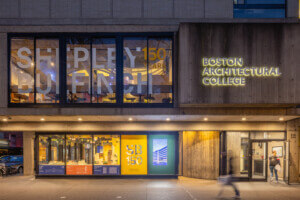Following the naming of Lesley Lokko as curator of the 18th International Architecture Exhibition of La Biennale di Venezia—the 2023 Venice Architecture Biennale—last December, the Ghanaian-Scottish architect and academic has revealed the curatorial theme and title of the forthcoming exhibition: The Laboratory of the Future.
The announcement was made yesterday, May 31, by Lokko and Roberto Cicutto, president of La Biennale di Venezia. Lokko, who served on the jury of the Golden Lion Award for the 17th Venice Architecture Biennale, is the first person of African descent to be appointed for the lead curatorial role and only the fourth woman following SANAA’s Kazuyo Sejima (2010) and Yvonne Farrell and Shelley McNamara of Irish firm Grafton Architects (2018).
When reflecting on her appointment as curator in December, Lokko noted that “architects have a unique opportunity to show the world what we do best: put forward ambitious and creative ideas that help us imagine a more equitable and optimistic future in common.” Her remarks at the time were made from “the youngest continent in the world” and it is that continent, Africa, that will serve as the thematic cornerstone of the 2023 Venice Architecture Biennale.
“In Europe we speak of minorities and diversity, but the truth is that the West’s minorities are the global majority. There is one place on this planet where all these questions of equity, race, hope and fear converge and coalesce. Africa. At an anthropological level, we are all African. And what happens in Africa happens to us all,” said Lokko in the formal announcement of the next Architecture Biennale’s title and theme. (You can read her full introduction here.)
Born in Scotland, raised in Ghana, and receiving her architectural training at The Bartlett and University of London, Lokko’s career in academia has seen her traverse the globe, teaching and holding leadership posts at myriad institutions in the U.K. and in North America.
Africa has also remained a constant. In 2015, Lokko founded the Graduate School of Architecture at the University of Johannesburg as the sole dedicated postgraduate school of architecture in Africa and the only school on the continent to follow the Unit System, a pedagogical method first developed at the Architectural Association School of Architecture in London. Last year, Lokko, alongside David Adjaye, established the African Futures Institute (AFI) in the Ghanaian capital of Accra. In conversation with AN, Lokko described that project as having “been in the background for almost two decades.”
In her role as curator of the 18th Venice Architecture Biennale, Lokko has envisioned the exhibition as a workshop of sorts for architects, designers, and creatives—a laboratory in which postcolonial Africa, youthful and resilient, serves as an exemplar of progressive change. “Lesley shows determination and courage in using two words in her title that are time-worn but irreplaceable – ‘laboratory and future‘ – to restore the full importance of their meaning,” remarked Cicutto. “You will understand how her approach looks very much like the proposal for a pact between the visitors of La Biennale, the world of architecture and of culture in general.”
Lokko’s full curatorial statement reads:
“Firstly, Africa is the laboratory of the future. We are the world’s youngest continent, with an average age half that of Europe and the United States, and a decade younger than Asia. We are the world’s fastest urbanising continent, growing at a rate of almost 4 percent per year. This rapid and largely unplanned growth is generally at the expense of local environment and ecosystems, which put us at the coal face of climate change at both a regional and planetary level. We remain the most under-vaccinated continent at just 15 percent, yet recorded the fewest deaths and infections by a significant margin that the scientific community still can’t quite explain. So often on the wrong side of hope and history, the resilience, self-reliance and a long, long history of grass-roots community health care suddenly tipped the balance in our favour. The long and traumatic history of forced migration through the trans-Atlantic slave trade is ground on which successive struggles for civil rights and a more civil society are being fought all over the world today. In all the talk of decarbonisation, it is easy to forget that black bodies were the first units of labour to fuel European imperial expansion that shaped the modern world. Racial equity and climate justice are two sides of the same coin.
But hope is a powerful currency. To be hopeful is to be human. At a deeply personal level, I owe my presence at this table today to the tireless demands for a more just, more inclusive and more equitable fought for by generations before me. The vision of a modern, diverse, and inclusive society is seductive and persuasive, but as long as it remains an image, it is a mirage. Something more than representation is needed, and architects historically are key players in translating images into reality.
Secondly, La Biennale di Venezia itself is also a kind of laboratory of the future, a time and space in which speculations about the discipline’s relevance to this world—and the world to come—take place. Today, the word ‘laboratory’ is more generally associated with scientific experimentation and conjures up images of a specific kind of room or building. But Richard Sennett’s examination of the word ‘workshop’, from which the word ‘laboratory’ stems, deepens the concept of collaborative endeavours in a different way. In the ancient world, in both China and Greece, the workshop was the most important institution anchoring civic life. In the aftermath of the American civil war, Booker T. Washington, an ex-slave, conceived a project in which freed slaves recovering from slavery would leave home, train at two model institutions, the Hampton and Tuskegee Institutes, and return to their home communities. Importantly, during this temporary relocation, cooperation would be forged by direct experience and daily contact with one another as equals. We envisage our exhibition as a kind of workshop, a laboratory where architects and practitioners across an expanded field of creative disciplines draw out examples from their contemporary practices that chart a path for the audience—participants and visitors alike—to weave through, imagining for themselves what the future can hold.”
The 18th Venice Architecture Biennale, held at the Giardini, the Arsenale, and other locations, will kick off on May 20, 2023 and conclude November 26, 2023. Meanwhile in Venice, the Cecilia Alemani-curated Biennale Arte 2022, the 59th International Art Exhibition, is now underway.











